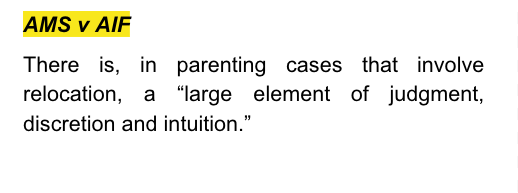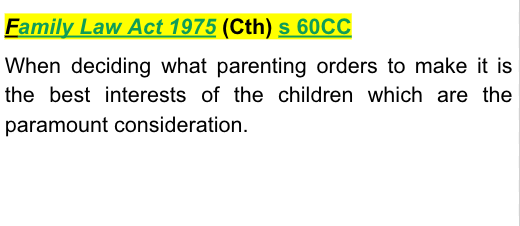- · 4802 friends
Mother Seeks Sole Parental Responsibility

Marella & Marella [2022] FedCFamC2F 1564 (16 November 2022)

The child has not seen the Father since the parents separated in late 2018. The Mother alleges that the father is a risk to her and X. The Court, in determining parenting orders, assessed the issue of risk relevant to each parent's general parenting capacity.

Facts
X has just turned 7 years old (he was born in 2015). The Mother who has coped with a number of issues including the breakdown of her marriage to X’s Father (separation was in November 2018); the Father’s significant mental health issues which led to him admitting himself to a private mental health facility in Sydney; and X (then aged 3 years) having open-heart surgery at L Hospital in 2018, and because of complications, within 5 days of his first operation X had further surgery to have a “pace-maker” inserted. X continues to be monitored for his significant heart issues.
The Father (and his very supportive, if not industrious, and from the Mother’s perspective, somewhat overwhelming, family) have spent little or no time with X since separation. The Father, who lives in Canberra while his family live in City C (New South Wales), says that, based on his treatment (psychiatric and medication) he is doing well and is relevantly capable, not to mention very keen, to re-engage with X. The father sought Orders whereby X would come into his primary care if the Mother did not comply with Orders that re-introduced time between him and X.
From the context of perceived death threats from the Father (although the Father denied the threats), the Mother felt she needed to protect herself and [X] by moving into hiding. The Mother now has successfully undergone treatment and appears to be mentally well. She still has high degrees of anxiety and fearfulness.

Issue
Whether or not it would be in the child’s best interests if X was ever to move from the Mother’s primary care.

Applicable law
Family Law Act 1975 (Cth) s 60CC - provides that when deciding what parenting orders to make it is the best interests of the children which are the paramount consideration.

AMS v AIF (1999) 199 CLR 160 - observed that there is, in parenting cases that involve relocation, a “large element of judgment, discretion and intuition.”


Analysis
At the outset of the Father’s cross examination he confirmed that he was in receipt of a disability pension. He confirmed that he was also in receipt of some “income protection” which was dependent upon him providing a doctor’s report each time. The income protection was paid approximately every four weeks. The amount he received under this income protection scheme was approximately $2,770 (every four weeks).
For someone who said that he was a “hands-on” Father when the parties were together, he seemed strangely dependent upon what some course had told him about how to handle or to respond to his young son, and/or heavily reliant upon his family for support in almost every respect. His family members were certainly much more “enthusiastic” and “energised” at the prospect of seeing X again. Perhaps the Father’s more sombre approach and disposition was medication related. His low “affect” was both surprising and somewhat troubling.
Given the Father’s ongoing treatment for his mental health, including his undisclosed episode and significant use of medication in early 2021, for this reason alone, it is unsurprising that the Mother is rather cautious if not downright wary of commencing X’s time with the Father, to put it rather euphemistically.
Conclusion
The Mother have sole parental responsibility for X born in 2015 (‘the child’). The child should live with the Mother. The Mother is to attend upon her general practitioner and provide them with a copy of the Assessment completed by Ms K dated 11 April 2022 and is to obtain a referral and Mental Health Plan for attendance upon a clinical or forensic psychologist. The Father must continue to attend upon his general practitioner, psychiatrist, psychologist and any other associated health care provider as recommended by his general practitioner, psychiatrist and psychologist.



















